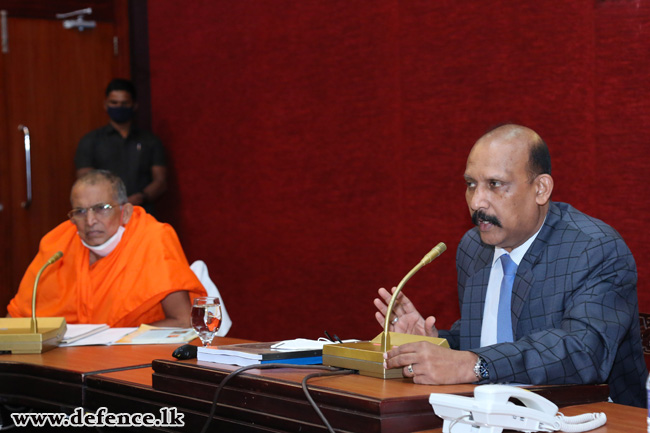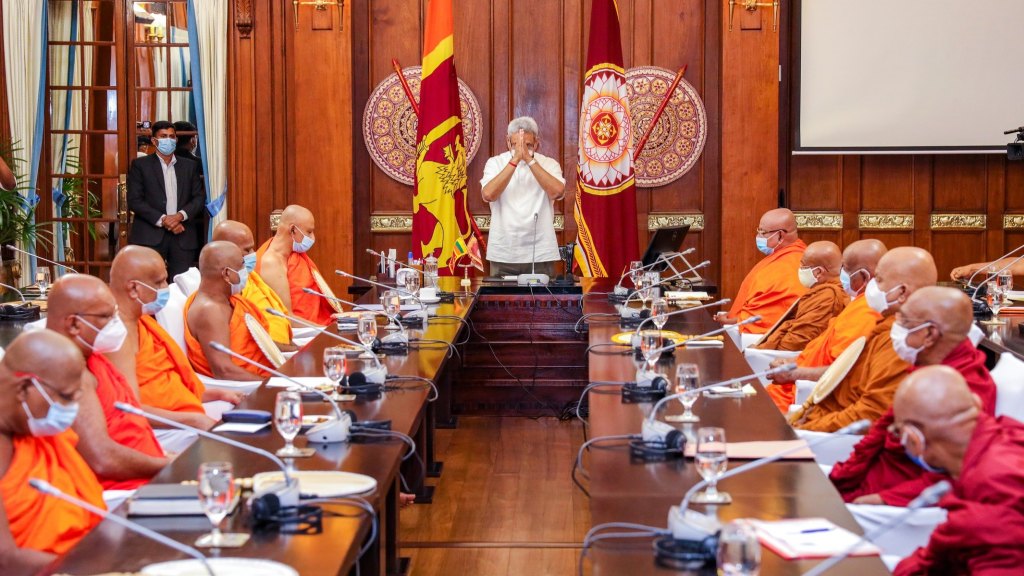![]()
Speaking to Tamil Net, Jaffna-based Attorney, academic and civil society activist, Kumaravadivel Guruparan, warned that the appointment of two Presidential task forces further emboldened the Sinhala Buddhist nationalist project and threatens to silence to internal dissent.
The two task forces set up by Sri Lankan President Gotabaya Rajapaksa are tasked with the archaeological management of the eastern province as well as creating a “secure country and a disciplined, virtuous, and lawful society”. These tasks forces have been widely condemned by the international community due to issues of accountability and the composition of the task force which is “exclusively Sinhala and include suspected war criminals”.
Archaeological task force

The task force for archaeological management is headed by the notorious war criminal and current Defence secretary Kamal Gunaratne.
Commenting on the archaeological task force, Guruparan maintains that the purpose behind the task force is to bolster an image of a unified Sinhala Buddhist Sri Lanka.
“This is something they’ve been doing right throughout, no governments are really an exception in that they want to present the NE as a uni-national space, a uni-national Sinhala Buddhist nationalist space […] So that it goes hand in hand with the identification of Sri Lanka as a unitary state and negates the claim of the north and east as the homeland of the Tamil people”.
Whilst he maintains that such a project is not a surprise for Tamil and Muslim communities in the North and East, he notes that the all Sinhala composition of the task force is a surprise.
“Usually with efforts like this there is a nominal Tamil or Muslim appointee to give the impression that it is an inclusive and accommodating taskforce”, Guruparan notes.
He states that it is an indication of Rajapaksa’s brazen Sinhala Buddhist nationalism.
“It shows how confident he is in his nationalism, in his politics but it also shows how Sinhala Buddhist nationalism in the post-war context has solidified […] The November election of Gotabaya Rajapaksa signifies a further consolidation of Sinhala Buddhist nationalism to an extent that we have never seen before”.
Guruparan maintains that this consolidation of Sinhala Buddhist nationalism is stronger than in the immediate aftermath of the war.
Legalising land grabs
Commenting on the language of the Gazette notification and the appointment of a survey general and land commissioner, Guruparan maintains that the broad mandate of the task force effectively provides the legal force to dubious claims to land.
The Gazette notification specifies that the task force may do “whatever is necessary for the preservation of archaeological sites”. This broad and vague mandate aims to legitimise the dubious claims made by Sinhala Buddhist monks such as Thilakawanse Nayaka who have pushed for aggressive expansionist policies in the East.
In 2018, he complained of local people encroaching on temple land and demanded more protection which enabled a greater military presence. Around the same period, the Archaeological Department responsible for the Pulmoaddai region complained of Hindu temples being built and visited by locals. In response, the government granted only 25 of the 500 acres requested for building said temples whilst instead granting a full 500 acres to the Archaeological Forest Reserve.
Read more from PEARL here: Sinhalization of pulmoaddai
“This is really bringing in the officials into one task force”, Guruparan said.
Also appointed to the task force is a senior forensic archaeologist from the University of Kelaniya, Professor Raj Somadeva. Somadeva is responsible for uncovering the remains of over 300 people in a mass grave in Mannar, including the remains of at least 23 children.
Somadeva claims that these remains predate the war and date back to the time of Portuguese rule. Guruparan notes that due to his ideological underpinnings, “huge questions of credibility” over his involvement in such a project have been raised.
In 2018, Tamil families of the disappeared held a demonstration in Mannar demanding action to identify the victims found in the Mannar mass grave, fearing the fate of their forcibly loved ones.
Read more here: 300 bodies and counting in Mannar mass grave
Disciplining civil society

The second task force was established with the specific aims of “secure country and a disciplined, virtuous, and lawful society”.
Guruparan highlights that within the Gazette notification the language is deliberately vague and that whilst there is a reference to drug issues, “the terms of reference are themselves very broad”.
Guruparan further states;
“What is scary is the fact that the gazette notification mentions at three places the need to curb unlawful activities but then doesn’t say what the specific type of work the taskforce is empowered to do”.
This is problematic as there are already law and order agencies which are set up to handle the matter. It appears that the task force will be superseding these agencies and this raises concerns over accountability as if public officials fail to comply with orders from the task force they will be reported to the President.
“It seems like an implicit authorisation for the task force and the tri forces to do what they want”, Guruparan warns.
Read more here: Sri Lanka’s Presidential Task Force threatens rule of law – International Commission of Jurists
Guruparan further maintains that this gazette notification appears to be “authorising the security machinery of this country than to engage in unlawful acts with legal sanction”. The establishment of an extra-legal regime has been underworking throughout the war and in the post-war context; this gazette seems to be expanding on that, Guruparan notes.
Tamils and Muslims are familiar with this extra-legal regime which has proven itself to be discriminatory and torturous. Similar legislation has been used in “the past to curb the legitimate protest and dissent of the numerically smaller communities” Guruparan tells Tamil Net.
He further states:
“It sorts of is a warning to activists […]
There is now an additional weapon in their armoury that they can use to curb their activities […]
It comes as a warning for people to go into silence, to tone down, and to follow suit with the agenda that Gotabaya Rajapaksa has for the country This is actually the real meaning for the word discipline in the gazette notification”.
Tamil and Muslim unity
Guruparan maintains that to push back against rising authoritarianism, “Tamils and Muslims unite in the North-East”. If they are able to, they will be an “unshakable force against the onslaught” of the Sinhala Buddhist nationalistic machine.
Guruparan calls for unity amongst Tamils and Muslims, stating:
“If there is one message that the Tamils and the Muslim must take, and particularly for the Muslims I hope, we are in this fight together […] The only way we’re going to do this is by unifying as one political force against the onslaught of the Sinhala Buddhist nationalist"
Read more from Tamil Net.




